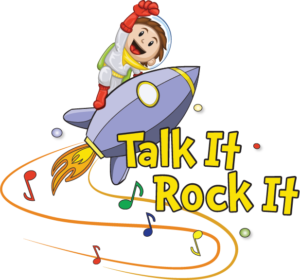
I know how important speech and language therapy can be for child’s future reading ability. Yes, speech and language therapy gets kids ready for reading. I remember one little student of mine, Abe, who had a significant delay of spoken language. His expressive vocabulary was limited to a strained “ma” for mom. His speech sounds were limited to one consonant, “ah,” and one vowel, “m.” He could not imitate anything verbally. He was 2 ½ years old.
Set the Stage for Reading
Starting speech and language therapy early not only helps children progress more quickly, but it can also decrease a child’s frustration. Kids want to get their message heard and understood. In addition, normal speech and language development sets the stage for reading.
I worked with Abe for about 9 months. He loved music, and I used my songs from Imitation Exploration as a home practice tool. His mom and I worked on ways to help him imitate sounds, words, and eventually phrases. Initially, we played activities like “tea party” where we would pretend to take sips of tea followed by a sigh, “ah.” Initially, he could not imitate this simple vowel sound, but he enjoyed the game and practiced until he was able to say this vowel easily on command.
When he was able to initiate that sound, we thought of ways he could say “ah” in a functional way. He couldn’t use any final consonants, but we encouraged him to say, “ah” for “on” and “off” when watching his dad turn on the microwave, turn on the lights, and other situations where those words made sense. Functional vocabulary was essential in helping Abe learn the power of his voice. We kept building more vowels, combined them with consonants, and kept adding vocabulary words.
So, how does this relate to his READING SKILLS? Plenty!
Abe’s parents were totally onboard with helping this little guy learn to talk. They sang songs that I knew would help develop specific speech sounds that he needed to practice. With a little coaching, Abe’s parents read books like Go, Dog, Go in a way that gave him lots of verbal practice and in a way that made him successful.
We talked about all of the ways that they could encourage Abe to talk during their daily routines. Abe was practicing his speech, language, and communication and was having a blast doing it.
He was also one of my first clients to practice speech using a prototype of my Blast Off Board. We built words by teaching him sound blending. He continued in speech therapy for a while after he left my services. He attended an inclusion preschool program for children with speech and language delay and typically developing children. Abe flourished.
Fast forward to Abe’s first grade year.
I lost track of Abe when he left our early childhood special education program. Out of the blue, I got a phone call from Abe’s mom when he went to first grade. I hadn’t talked to her in years, so the call was a surprise. It was October, and his mom had just come back from a parent teacher conference. His first-grade teacher told her that Abe was a “stellar reader” at a second-grade level with excellent reading comprehension and reading fluency. His understanding of phonics was excellent. I was so thrilled to hear that little Abe was on his way to becoming a powerful reader!
What Abe’s mom said after that was so heart-warming for me. She thanked me and believed wholeheartedly that all of that speech practice we gave him when he was 2 had a huge effect on his reading readiness. He trained his ears to hear sounds, sound combinations, words, and phrases. He learned to pronounce words correctly. He could differentiate between similar sounds and rhyming words. He was exposed to books and the printed word. He heard songs that encouraged a blending of sounds to make words. He was learning about phonemic awareness in a way that was fun and functional.
Early Intervention has long terms effects
I humbly thanked his mom, feeling that I certainly was NOT the major reason that he was such an awesome reader. There were so many others in his world that played a huge part. But after I contemplated her phone call, I realized that working on his communication disorder at a young age, knowing what to practice, motivating him, and teaching the parents what to do were certainly factors. I was able to help the parents believe that what they did with their child at age 2 would have a long lasting effect. It could even potentially decrease the chance of reading difficulties.
Components to Emergent Literacy
To get your child ready for reading, be aware that what you do at a young age will make a huge difference! Here are the components to early literacy and reading readiness.
1. Oral Language
Talk to your child. It’s that simple. Your child needs to hear and understand thousands of words.
2. Phonemic Awareness
Your child should be exposed to songs and poems that rhyme. Tap out the syllables in words. Talk to your child about how some words begin with the same sound like baby and ball.
3. Print Knowledge
Point out the words in books as you read them. Point out traffic signs, signs at stores, words and logos on boxes of food.
4. Alphabet Knowledge
Sing the alphabet song and help your child learn to recognize the letters of the alphabet. Spell your child’s name frequently.
5. Emergent Writing
Expose your child to pencils, crayons, markers, and paints. Let your child explore drawing and creating art projects. Talk about “writing” and pretend to write shopping lists, birthday cards, etc.
There is much you can do to help your child be ready for reading. Enjoy!


